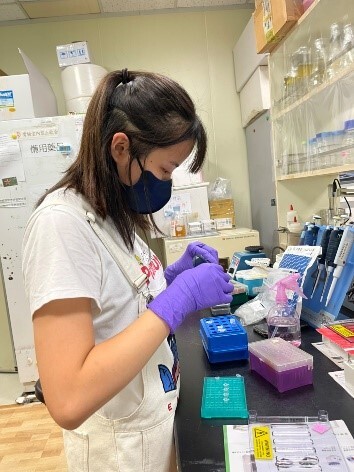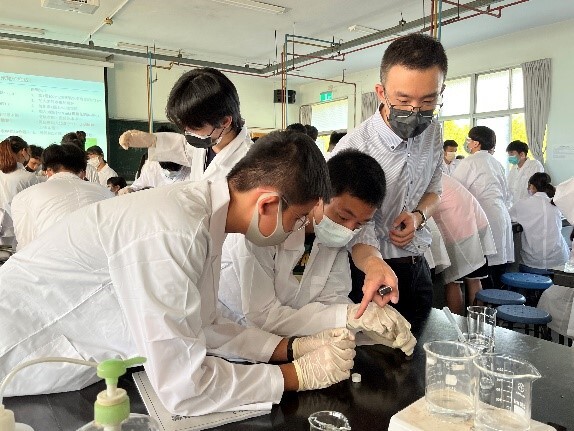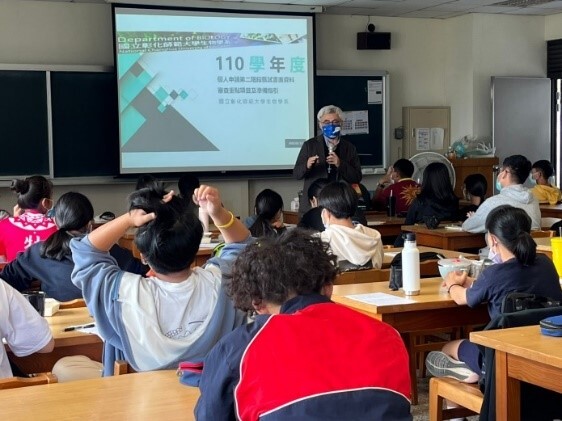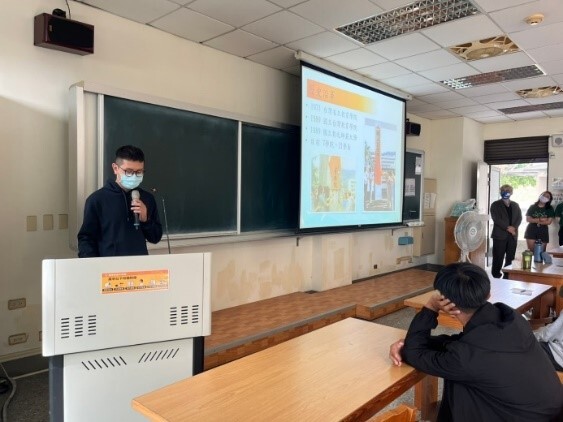SDG 10.6.3 Access to university underrepresented groups recruit
To facilitate the enrolment of underrepresented groups, NCUE provides a sufficient number of admission or employment channels for students, faculty, and staff:
1. Students:
(1)NCUE provides opportunities for disadvantaged students (such as indigenous students, students with disabilities, and economically disadvantaged students).
(a)Encourage departments to actively provide quotas to increase the admission opportunities for disadvantaged students.
i. In recent years, NCUE has actively provided additional quota for indigenous people and students with disabilities to be admitted to NCUE through different channels.
ii. NCUE established its “Indigenous Peoples’ Special Class for Aging Health Promotion and Care Management”, which offered 30 admission openings for indigenous students.
iii. NCUE offers multiple entrance programs for students with disabilities, such as independent and screening-based admissions, to enhance their opportunities to study at our school.
iv. To increase the opportunities for economically disadvantaged students (including those from low-income households, middle-low-income households, and special circumstances backgrounds), and to uphold the principles of social justice, NCUE has implemented a "Priority Admission" mechanism since 2018. This mechanism involves lowering admission criteria to increase the admission chances for economically disadvantaged students. Additionally, starting from 2019, we have introduced our "The Soaring Eagles Admissions Category". Under this initiative, certain departments shall allocate a number of admission slots to each category, with reduced test score requirements and exemption from interviews, all aimed at enhancing the opportunities for economically disadvantaged students to enroll at NCUE.
v. In order to encourage departments to actively provide additional quotas for disadvantaged students, NCUE’s “Measures for the Establishment and Promotion of the Admission Strategy Committee” stipulates that the actual total registered number of additional quotas (including overseas students, students with disabilities, and indigenous students) of various programmes in a department in the current academic year will be multiplied by NT$5,000 as additional affair expenses for the department. Please refer to Annex 10.6.3A, “Measures for the Establishment and Promotion of the Admission Strategy Committee”.
(b)Reduce the burden for disadvantaged students–waive the registration fee as well as subsidise the transportation and accommodation expenses for “individual application”.
i. NCUE will exempt economically disadvantaged students (low-income households and middle-to-low-income households) from the registration fee when they take our self-held admission examinations, such as the ‘Second-stage Screening Test for Individual Application for Bachelor’s Programmes’, “Transfer Examination for Bachelor’s Programmes’, ‘Reference Screening Test and Admission Examination for Master’s and Doctoral Programmes”, and “Separate Admission of Students with disabilities to Bachelor’s Programmes”.
Annex:
Please refer to Annex 10.6.3B - Department Rules of Admission Guide for Individual Application for University Admission in 2022
Please refer to Annex 10.6.3C - NCUE’s 2022 Admission Guide for Separate Admission of Students with Disabilities
Please refer to Annex 10.6.3D - Transfer Admission Examination Guide for Bachelor’s Programmes in 2022
Please refer to Annex 10.6.3E - Guide on Reference to Master’s and Doctoral Programmes in 2022
Please refer to Annex 10.6.3F - Admission Guide for Master’s Programmes in 2022
Please refer to Annex 10.6.3G - Admission Guide for Doctoral Programmes in 202
ii. During the second-stage screening test for “individual application” and the “Admission Screening for 4-year Technological Undergraduate and 2-year Vocational Junior College Programmes”, the transportation and accommodation expenses required by the students will be subsidised according to their place of residence, and the departments will give the subsidies to the qualified candidates on the day of the screening test.
(c)Implement projects such as the Higher Education Sprout Project and The Soaring Eagles Project to increase admission opportunities for disadvantaged students.
With the promotion of the Higher Education Sprout Project, NCUE has increased diversified admission opportunities for senior high school students year by year. This includes encouraging departments to actively provide quotas to increase admission opportunities for disadvantaged students, waiving registration fees, subsidising transportation and accommodation fees for “individual application”, and holding lectures in senior and vocational high schools (please refer to Annex 10.6.3H).
NCUE continues to conduct the “Caring for Regional High Schools and Vocational High Schools” micro-course activities to attract more students who come from families in the lowest 20% income group in Taiwan to study at NCUE. Figure 1 is a snippet of our Soaring Eagles Learning Enhancement Activity, and Figure 2 features the implementation of Adaptive Teaching Micro-Course. Through these activities, NCUE aims to attract more students from families in the lowest 20% income bracket in Taiwan to enroll at NCUE. As of the end of 2022, 378 students from families in the lowest 20% income group are studying at NCUE, accounting for 5.3% of all students.
|
|
|
|
Figure 1. Soaring Eagles Learning Enhancement - Learning through Experimentation-Verifying sample through electrophoresis after PCR |
Figure 2. Adaptive Teaching Micro-Course - Introduction to Nanoprecision Medicine and Hands-on Workshop |
(d)Subsidise disadvantaged students to enter university, and simultaneously, plan and improve the mechanism of schooling and study counselling to promote social class mobility.
In addition, in order to encourage economically disadvantaged students (children from low-income families, middle-to-low-income families, and families in special circumstances) to study hard and to improve their chances of entering national universities, NCUE has planned a series of perfect schooling, study, and counselling mechanisms that enable students to exhibit their personal potential in National Changhua University of Education, in the hope of achieving the goal of increasing the number of economically disadvantaged students admitted annually.
In 2022, the departments provided 129 admission seats for economically disadvantaged students (children from low-income families, middle-to-low-income families, and families in special circumstances). A total of 190 students applied and 84 students were admitted.
On February 13, 2022, staff from the Admissions Section of the Office of Academic Affairs and the Indigenous Resources Center of the Office of Student Affairs visited National Ping Pei Senior High School, a key indigenous school, for an educational tour and student recruitment. Approximately 40 participants attended this event, and the promotional activities are detailed in Figures 3-4.
|
|
|
|
Figure 3. Dean of Student Affairs Ken Chuan-Fu led NCUE staff to visit National Ping Pei Senior High School to explain the key items and preparation guidelines for documentations needed in the second stage of university enrollment application |
Figure 4. Staff from the Admissions Section of the Office of Academic Affairs presenting an overview of NCUE’s colleges and departments, as well as the various pathways for admission and an explanation of additional admission quotas |
References:
Please refer to Annex 10.6.3H - Admission Measures for Disadvantaged Students and Achievements in 2022
Please refer to Annex 10.6.3.I - Recruitment outcomes for key indigenous schools in 2022
(2)Providing exceptionally talented students with multiple admission approaches:
NCUE is open to students with outstanding athletic performance. 9 students were admitted to NCUE’s Department of Sports through athletic performance screening, which offered 73 places.
2. Employee
Having enacted the National Changhua University of Education Commitment of Sustainability, the university spares no effort to take care of employees with disabilities. To ensure inclusion and equity, NCUE abides by the rules stipulated by the Employment Service Act, Gender Equity Education Act, and People with Disabilities Rights Protection Act, and ensures that no forms of discrimination or inequality due to race, belief, disability, and gender are allowed under the rules and regulations of the university, ensuring equal pay for faculty members. The number of employees with disabilities in NCUE conforms with the People with Disabilities Rights Protection Act. We continuously provide help in optimizing the work environment, and prioritize accommodating employees with disabilities so that they can have a safe and secure work environment.
(1)NCUE provides adequate employment channels for the recruitment of faculty and staff from underrepresented groups, in accordance with regulations.
(a)Pursuant to Article 38 of the People with Disabilities Rights Protection Act:
Any given government department (agency/organisation) of individual levels, public school, or public business agency/organisation/institution whose total number of employees is no less than 34 shall employ people with disabilities with the capability to work, and the number of employees with disabilities shall be no less than 3% of the total number of employees. In 2022, NCUE had 827 employees, among whom 39 had disabilities, and the proportion of employees with disabilities was 4.72%, which was higher than the stipulated standard. The statistics on the employment of staff with disabilities at NCUE are shown in Table 1.
(b)Pursuant to Article 4 of the Indigenous Peoples Employment Rights Protection Act:
Among the total number of the following personnel hired by each level of government, public schools, and state-owned businesses, excluding those located outside Penghu, Jinmen, and Lianjiang County, there shall be 1 indigenous individual for every 100 workers: 1. Contract employee; 2. Stationed police; 3. Mechanic, driver, janitor, cleaner; 4. Fee administrator; 5. Non-technical workers not requiring the qualifications of civil servants. The total number of personnel listed in the preceding paragraph shall be one indigenous individual for every government agency, public school, and public institution at all levels with over 50 employees but less than 100 employees. The total number of these five categories of staff employed by NCUE was 9 in 2022, so according to the above regulations, the employment of indigenous faculty or staff members was not required. However, in order to take care of disadvantaged groups, NCUE had employed 1 indigenous faculty and staff members, which was higher than the stipulated standard. The statistics on the employment of aboriginal staff at NCUE are shown in Table 1.
Table 1. Statistics on the employment of staff with disabilities and
aboriginal staff at NCUE in 2022
|
Standard |
Percentage (number) of employees from disadvantaged groups that should be employed by NCUE according to regulations |
Actual percentage (number) of employees from disadvantaged groups |
Total number of faculty and staff members in NCUE |
|
People with Disabilities Rights Protection Act |
Faculty and staff members with disabilities 3% (24 people) |
Faculty and staff members with disabilities 4.72% (39 people) |
The total number of faculty and staff members in NCUE was 827 |
|
Indigenous Peoples Employment Rights Protection Act |
Indigenous faculty and staff members 0% (0 person) |
Indigenous faculty and staff members 0.1% (1 people) |
The total number of employees from the five categories was 9 |
References:
Please refer to Annex 10.6.3J - People with Disabilities Rights Protection Act
Please refer to Annex 10.6.3K - Indigenous People Employment Rights Protection Act
Please refer to Annex 10.6.3L - National Changhua University of Education Commitment of Sustainability
(2)Supporting mechanism for employees with disabilities and indigenous employees:
Applying to implement the Job Accommodation for People with Disabilities plan on behalf of the staff, prior allocation of dormitory rooms to employees with disabilities, and accessible facilities in dormitories.
(a)On behalf of hearing-impaired faculty members, NCUE applied to the Changhua County Government and implemented the “Job Accommodation for People with Disabilities” plan. A total of NT$126,288 was allocated to NCUE. The subsidized services and used amounts are as follows:
i. Transcription services: 180 hours in total, with NT$500/hour compensation subsidized, totaling NT$90,000.
ii. Assistance from helpers in the workplace: 216 hours in total, with NT$168/hour compensation subsidized, totaling NT$36,288. Please refer to Annex 10.6.3M, Application documents submitted to Changhua County Government concerning job accommodation.
(b)Prior allocation of dormitory rooms to employees with disabilities On the first floors of the Zhong and Xiao Buildings of the university’s dormitories (single room), suites with a bedroom and toilet with accessible bathroom facilities are available for qualified faculty members and staff to use.




